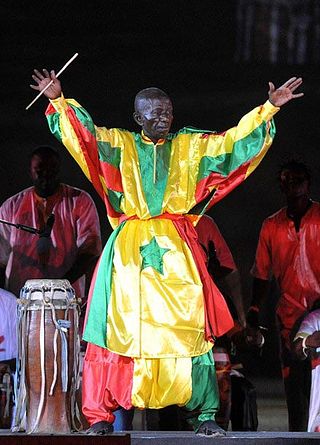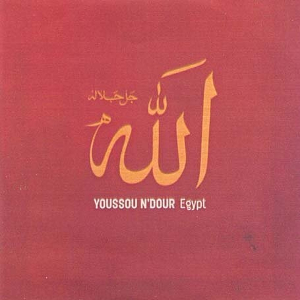Related Research Articles

Youssou N'Dour is a Senegalese singer, songwriter, musician, composer, occasional actor, businessman, and politician. In 2004, Rolling Stone described him as, "perhaps the most famous singer alive" in Senegal and much of Africa and in 2023, the same publication ranked him at number 69 on its list of the 200 Greatest Singers of All Time. From April 2012 to September 2013, he was Senegal's Minister of Tourism.

Senegal's music is best known abroad due to the popularity of mbalax, a development of conservative music from different ethnic groups and sabar drumming popularized internationally by Youssou N'Dour.

The music of the Gambia is closely linked musically with that of its neighbor, Senegal, which surrounds its inland frontiers completely. Among its prominent musicians is Foday Musa Suso. Mbalax is a widely known popular dance music of the Gambia and neighbouring Senegal. It fuses popular Western music and dance, with sabar, the traditional drumming and dance music of the Wolof and Serer people.

Mamadou "Jimi" Mbaye is a Senegalese guitarist best known for his work with Youssou N'dour. Mbaye has developed a unique Senegalese guitar style in which he makes his Fender Stratocaster sound like local instruments such as the kora or xalam.

The Wolof, the largest ethnic group in Senegal, have a distinctive musical tradition that, along with the influence of neighboring Fulani, Tukulor, Serer, Jola, and Mandinka cultures, has contributed greatly to popular Senegalese music, and to West African music in general. Wolof music takes its roots from the Serer musical tradition, particularly from the Serer pre-colonial Kingdom of Saloum. Virtually all Wolof musical terminology including musical instruments comes from the Serer language.

Thione Ballago Seck was a Senegalese singer and songwriter in the mbalakh genre. Seck came from a family of griot singers from the Wolof people of Senegal. He first performed with Orchestre Baobab, but he later formed his own band, Raam Daan, of which he was a member until his death in 2021.

Doudou Ndiaye Rose was a Senegalese drummer, composer and band leader, and was the recognized modern master of Senegal's traditional drum, the sabar. He was the father of a musical dynasty that includes some of the most successful traditional musicians of contemporary West Africa. He was one of the first musicians to bring Senegalese traditional music to the attention of the world.
Mbalax is the urban dance music of Senegal, Mauritania and the Gambia. The musical style is rooted in the indigenous instrumental and vocal styles accompanied by polyrhythmic sabar drumming of the Wolof, a social identity that includes both the original Wolof people of the Greater Senegambia region and the urban panethnic identity that arose during colonialism. A cultural value proved by Wolof is their one's and respect of other cultural and musical practices. Therefore the origins of mbalax include a fusion of Wolof, Soce, and Serer music, rhythms, and instrumentation. The Wolof ability to include the diverse styles from Senegambian groups has allowed the sabar and its modern music formation to thrive. It is not uncommon, for example, for a sabar event to include music of the Serer such as the njuup, which is connected to sacred ndut rite ceremonies. In this way many ethnic groups may participate and the inclusion also increases the accessibilyt and popularity of the genre. In the 1970s, mbalax arose as Senegalese fused indigenous music styles with urban dance music from the African diaspora, the West, and the continent. These foreign sounds included U.S. soul, jazz, and salsa. Afro Cuban musics from the diaspora, Congolese rumba, and rock were also fused with the rhythms of sabar that were now played on the electric bass, guitar and keyboards.
Ashley Maher is a Canadian singer and songwriter who has meshed the rhythmic impulses of West Africa and Latin America with Western song structures.

Alioune Palla Mbaye dit « Nder » is a Senegalese singer. Nder takes his name from the n'der, the drum favoured by his griot father.
Habib Faye was a bassist, keyboardist, guitar soloist, arranger, composer and Grammy-nominated producer from Senegal. He was mostly known as the musical director for Youssou N'dour's Super Étoile de Dakar. He was one of the most talented African bassists of the last quarter-century.

Egypt is a Grammy Award-winning album by the Senegalese musician Youssou N'Dour, on which he is accompanied by the Egyptian Fathy Salama Orchestra. By incorporating Arabic influences and focusing on Muslim religious themes, the album was a departure from previous N'Dour releases. In the original Senegalese release, it was named Sant Allah.

Viviane is a Senegalese pop singer who is the former backing vocalist and former sister-in-law of Youssou N'Dour. Viviane is known as the queen or reine of Senegalese music. Her music combines traditional Senegalese mbalax music with elements of U.S. rap, R&B and Country music. She released her first album in 1999 and formed a group called Le Jolof Band in 2001. Most of her songs are in either Wolof or English though a few are in French, the official language of Senegal. On March 31, 2012 the label Wonda Music of producer Jerry 'Wonder' Duplessis signed her to his recording label. Since then, Viviane has been working with Jerry Wonda and her album was released in 2015.

Immigrés is an album by Senegalese singer and percussionist Youssou N'Dour. AllMusic remarks that the album is "a good part of what put [N'Dour] on the international map".
Omar Pene is a Senegalese vocalist and composer, who is the lead singer of Super Diamono, and is now a solo artist.

Senegalese wrestling is a type of folk wrestling traditionally performed by several African tribes, from the Wolofs of West Africa to the Nuer and Dinka of South Sudan. and now a national sport in Senegal and parts of The Gambia, and is part of a larger West African form of traditional wrestling. The Senegalese form traditionally allows blows with the hands (frappe), the only one of the West African traditions to do so. As a larger confederation and championship around Lutte Traditionnelle has developed since the 1990s, Senegalese fighters now practice both forms, called officially Lutte Traditionnelle sans frappe and Lutte Traditionnelle avec frappe for the striking version.
Étoile de Dakar were a leading music group of Senegal in the late 1970s and early 1980s. Youssou N'Dour was one of the singers in the band and the band was a major part of N'Dour's rise to stardom in Senegal.
The Njuup tradition is a Serer style of music rooted in the Ndut initiation rite, which is a rite of passage that young Serers must go through once in their lifetime as commanded in the Serer religion.
Musa Ngum was a singer and songwriter who was very popular in Senegal and Gambia. He was one of the pioneers of mbalax music, and "helped to define the mbalax style of popular music in the Senegambia" and "had a strong influence on Youssou N'Dour and other mbalax pioneers". He was "something of a cult icon back in the Senegambia region, and a pioneer of the mbalax fusion style". The mbalax, which originated from the Serer religious and ultra–conservative njuup music tradition sang during Ndut rites by circumcised boys was the foundation of Ngum's music career. He mastered many of the njuup classics and built a name for himself while at the same time developing his voice.

Set is an album by the Senegalese musician Youssou N'Dour, released in 1990. The album in part inspired the Senegalese youth movement Set-Setal, which sought to beautify Dakar.
References
- ↑ "Mbaye Dieye Faye: "Dieu a fait que nous avons une vie commune, un lien. En plus, Youssou ne calomnie jamais"". Xalima.com (in French). 2020-06-12. Retrieved 2022-02-19.
- ↑ "Waly Seck s'adresse à Youssou Ndour et Mbaye Dièye Faye pour…". Xalima.com (in French). 2017-10-01. Retrieved 2022-02-19.
- ↑ The Daily Observer (Banjul) (2 September 2011). "Gambia: I Will Shake Duplex Tonight Says Mbaye Dieye Faye, As He Prepares for Mega Dance". AllAfrica.com.
- 1 2 Ba, W and Ndiaye M, December 4, 2005, Palabres avec Mbaye Dieye Faye, April 13, 2006; From http://www.xalima.com/musique/modules.php?name=News&file=article&sid=119
- 1 2 Niang, M. O., Mbaye Dieye Faye: Life and work, April 13, 2006, « Interview with Mbaye Dieye Faye,» Dakar, Senegal
- ↑ "True love: Quand Mbaye Dieye Faye et sa femme expriment leur amour..." Xalima.com (in French). 2019-01-28. Retrieved 2022-02-19.
- ↑ Boizet, S (April 13, 2006). "Les trémoussements sataniques". Agence Tropiques. Archived from the original on 2008-03-08.